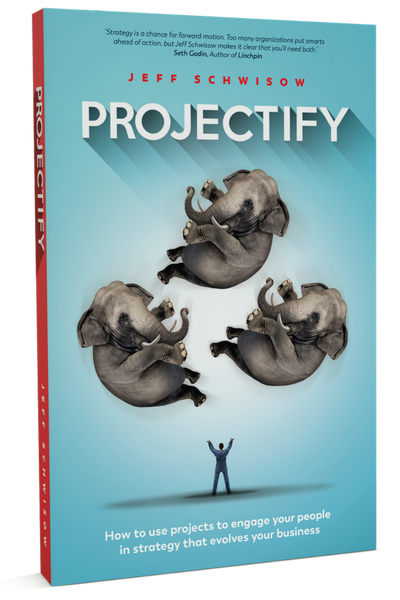The ‘business of busyness’ creates a definition of productivity that undermines our preparation for the future
To thrive – or perhaps even survive – in today’s highly dynamic environment, requires future-focused thinking that’s fluid. It requires anticipatory activity that will allow you to adapt to conditions and events as they unfold. It requires that you and your people devote deep thought to what might lie ahead in an effort to prepare for that future.
Yet, the ‘business of busyness’ – our obsession with being constantly productive and maximising efficiency – is a major obstacle in getting this future-focused work done. Because, all things being equal, future-focused work will always lose out to the immediate and urgent unless that work is set apart through distinction. And to distinguish strategic activity from other operational expectations it needs to have importance and priority – people need to see that it’s valued by their leaders.

Time and attention are your business’s most valuable resource and how effectively you and your people spend them is one of your most important investment decisions. By shifting your organisation’s definition of ‘productivity’ from…
every individual wringing every minute out of every day
to…
maximising the long-term value the business derives from your time
you open the door to more nimble responses to changes in the business environment. It allows you to move from reacting to the negative impact that change is having on your P&L reports or your sales numbers to thoughtfully adapting to the future so that you create a positive impact on your business.
Productivity has been re-defined
Productivity is a simple concept. It’s the relationship between the value we produce, and the input required to produce it. Its power lies in the important insights it provides into the ‘effectiveness’ of your business endeavours. The most valuable perspective from which to consider is the holistic rather than the incremental.
However, today, as the daily demands on people’s time have increased, as the volume of information processing in our hyper-connected world places unprecedented pressure on the attention of business leaders, time and attention have become your business’s most valuable commodities. This has shifted much of the focus on productivity from effectiveness to efficiency.
We have become enamoured with the idea that wringing every minute out of every day – out of every human encounter – is the key to business and personal success. That if we take the concept of productivity to ever-smaller increments – if we maximise the amount we produce from every hour or minute of the day – the sum of the parts will deliver an outstanding whole. It rarely does.
Our activities become focused on maximising the immediate results from our actions – irrespective of the value those results deliver. This drives an emphasis on minimising the expenditure of time and attention on things that don’t provide immediate benefit.
Busyness has become a surrogate for efficiency
The number of apps, business books, podcasts and articles devoted to this new definition of productivity is growing at an alarming rate. We ‘humble-brag’ on social media about the incredible ‘number of things’ we accomplished during a day or week but fail to mention the amount of value that was created as a result. We define the quality of our business meetings by their brevity not by the richness of the interaction and synergy that is created. One of my clients defines Operational Excellence – one of its strategic pillars – as ‘a relentless focus on productivity and production’ rather than being exceptional in the work they do and the way that they do it.
This has some unintended consequences. Your people see keeping themselves busy as a manifestation of this productivity ethos. Organisations reward people on their daily output rather than their overall contribution to business health. Leaders model a behaviour of minute-optimised activity, meeting-filled calendars that set the standard for others to follow.
Research conducted by Julian Birkinshaw of the London Business School, found an average of 41% of knowledge workers’ time was spent on discretionary activities that offered little business value or could be handled competently by others. Similarly, research that Dr Andrew Pratley and I conducted for a client showed that about 35% of their engineers’ time was spent on work that created no value or wasn’t required to meet their business obligations. Much of this ineffective use of time can be traced back to fact that people are too ‘busy being busy’ to shape a future where they can focus on what’s valuable – or how to improve the value of their contributions.
This becomes a trap that the time- and attention-starved business can easily fall into – busyness becomes a behaviour that’s valued over the effective allocation of time and attention.
The traditional strategic approach encourages a focus on the immediate
Time invested wisely in your business’s long-term health rarely has a cause and effect relationship. Strategic action taken today might not manifest as business value for months or, perhaps, years to come. However, our traditional strategic approach, the very practices that should focus our thinking and activity on the future, will often conspire with this productivity obsession to keep us anchored in the present.
In most companies, strategic decision-making is done by a small senior group and then, generally, poorly communicated to the rest of the organisation.
The majority of their strategic activity is devoted to creating a strategic plan, the desired strategic outcomes and the measurement scheme to assess whether the planned outcomes are being achieved. Some organisations make a substantial investment in communicating their strategies with town hall meetings, roadshows and ‘internal marketing campaigns’ – posters in the breakroom, vision statements above the reception desk or catchy slogans in email signatures. But these communications tend to be couched in terms of high-level business outcomes or lofty organisational concepts that people struggle to relate to their work and their role.
Far too little effort is devoted to developing a strategy for implementing the strategy. Little thought is given to how the skills, experience and knowledge about the way the business operates can be used to translate these sweeping strategic objectives into the future-focused work that people do every day. In fact, research by McKinsey found that only 23% of companies use a formal process to operationalise their strategic direction.
Without a framework and the leadership necessary to drive the future-focused work of strategy, your people’s day-to-day decisions on how to spend their time are disconnected from strategic considerations. They’ll happily keep themselves busy with the urgent and important operational activities that allow them to feel productive – revelling in their strong sense of accomplishment from a day filled with solving problems, responding to requests or getting through their to-do list.
To bring the future into the present, take advantage of our affinity for the immediate
Don’t get me wrong, efficiency is fine on the factory floor (wherever and whatever your factory might be). But increasingly the efficiency of your ‘factory’ will become less of a differentiator to your business’s long-term success. All the work that can be made more efficient is being automated. Machines do a fine job of producing more in less time and everyone has access to the same machines.
For your business to thrive in the future you will need to invest time and attention into understanding that future.
Who do you aspire to be…?
Who will your customers be and what will they expect of you…?
What challenges will you need to overcome to realise those aspirations…?
Bring the future into the present – make it part of your business’s day-to-day reality – by taking advantage of how we naturally allocate our time and attention. Translate the ethereal world of strategic aspiration into specific, outcome-focused initiatives – strategic projects – that move the business step-by-step toward your future goals.
Be willing to experiment and test ideas to determine their potential strategic value. Give your people the time to create in service of your strategic aspirations. Give them the freedom to fail so that they’re willing to explore new territory and seek out new opportunities.
For future-focused work to compete with the immediate and urgent, it needs to be given distinction and importance. Today’s businesses need to create a culture where shaping the business for the future is an investment that’s a consistent and persistent part of the present.
Are you and your people too ‘busy being busy’ to focus on the work that will shape the future that you aspire to?
Does your organisation reward people on efficiency – their daily output – or effectiveness – their overall contribution to business health?
How do you show your organisation that you value investment in the long-term as much as immediate results?
Does your business tap into the knowledge and capabilities of its people to maximise the effective use of your organisation’s time and attention?
I’d love to hear your thoughts and experiences in the comments below.




Leave a Reply
Want to join the discussion?Feel free to contribute!